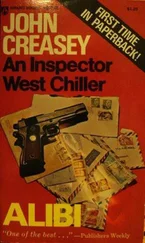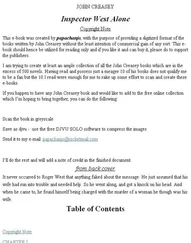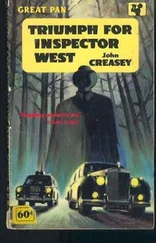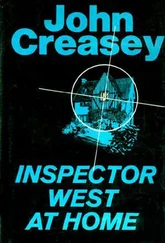John Creasey - Send Superintendent West
Здесь есть возможность читать онлайн «John Creasey - Send Superintendent West» весь текст электронной книги совершенно бесплатно (целиком полную версию без сокращений). В некоторых случаях можно слушать аудио, скачать через торрент в формате fb2 и присутствует краткое содержание. Жанр: Старинная литература, на русском языке. Описание произведения, (предисловие) а так же отзывы посетителей доступны на портале библиотеки ЛибКат.
- Название:Send Superintendent West
- Автор:
- Жанр:
- Год:неизвестен
- ISBN:нет данных
- Рейтинг книги:3 / 5. Голосов: 1
-
Избранное:Добавить в избранное
- Отзывы:
-
Ваша оценка:
- 60
- 1
- 2
- 3
- 4
- 5
Send Superintendent West: краткое содержание, описание и аннотация
Предлагаем к чтению аннотацию, описание, краткое содержание или предисловие (зависит от того, что написал сам автор книги «Send Superintendent West»). Если вы не нашли необходимую информацию о книге — напишите в комментариях, мы постараемся отыскать её.
Send Superintendent West — читать онлайн бесплатно полную книгу (весь текст) целиком
Ниже представлен текст книги, разбитый по страницам. Система сохранения места последней прочитанной страницы, позволяет с удобством читать онлайн бесплатно книгу «Send Superintendent West», без необходимости каждый раз заново искать на чём Вы остановились. Поставьте закладку, и сможете в любой момент перейти на страницу, на которой закончили чтение.
Интервал:
Закладка:
He knew that Lissa could have doped the Shawns; knew too that she could have betrayed him, Roger, before, although he didn’t think so, hated to think so. Could she have hired this plane and hired the pilot?
22
THE WHEELCHAIR
“WE’RE nearly there,” Lissa said. “There’s Trenton.” She pointed to a huddle of houses thousands of feet below, a township set amid green countryside, rolling and pleasant. Even up here, they could see the winding ribbons of roads and, not far away, a road wider and straighter than the others. “I wonder if they’re right, and they’ve found Gissing.”
“We’ll see,” said Roger, and forced out the question which he had locked in for the past hour and a half. “Why did you come the way you did? ”
“I knew Carl was up, there was a light under his door when I left your room. I thought if he saw me about in a robe, he would assume that I wasn’t leaving. But naturally he had to see me fully dressed. If he’s involved, he will have found a way of warning Gissing. I suppose I could, too.”
Roger shrugged. “Everyone but Ed Pullinger. It might have been better to stay behind. Carl wouldn’t have been suspicious of me leaving on my own.”
“I had to come,” Lissa said.
“Orders?”
Her eyes laughed at him. “Yes, and not mine.”
They were circling to land, and Roger could pick out the small airfield and the little ant-like figures of men waiting for them. He still didn’t feel sure of anything, but was less uneasy than he had been. The landing came, as always, before he expected it They taxied towards the airport buildings, past them slowly once, and then turned back again. He felt Lissa become tense. They turned again and taxied back, and Lissa said softy:
“There he is.”
“Who?”
Roger peered out of the little window, and needed no answer. A man sat in a wheelchair outside the doors of the building. He wasn’t smiling. He had a big face, and even from here his chin and jowl seemed dark. He was hatless, and his hair looked black as soot.
Marino had come home.
Marino’s hand-clasp had the warmth of old, tried friendship. He smiled at Roger, then put both hands out to Lissa, who bent down and kissed him on the forehead. He chuckled as he began to turn the wheels of his chair. Roger and Lissa walked, one on either side of him, across the grass towards the cars which were waiting on the road leading to the town.
“I need more of that treatment,” Marino said. “Have you two made it up?”
“Who’s quarrelled?” asked Roger.
Marino’s manner had a touch of boyishness which was good to see, which hid excitement and expectation; he seemed more than ever sure of himself.
“Didn’t she quarrel with you, Detective?”
Roger looked over his head at a demure Lissa.
“Lissa reported it to Washington, I picked up a message,” went on Marino. “It wasn’t a laugh, either, Lissa had been pointed out as a suspect by others, but we always come down on her side. Carl Fischer — it would surprise me if he were anti-American, but I’ve been surprised before. Ed Pullinger? He was at the swimming-pool when Ricky dropped that identity tag. We can work on that later. Sure you’ll recognize Gissing again, Roger?”
Roger said: “If I had to forget you or Gissing, I would forget you. Where is he?”
“We think he’s at a farm fifteen miles from here,” replied Marino. “He answers your description. He was seen in a car early last night. There were two cars, the same make as two of the cars which left Webster’s old house, and in the first there was a boy passenger, who seemed to be asleep. A traffic cop noticed them. He was directing traffic past an accident, they had to slow down, and he had a good look. So we checked. Several other people noticed the two cars, and three described Gissing well enough to make us hope. So we got into the garage during the night and scraped some of the dirt from under the guards. It’s Adirondacks dirt, of a kind you don’t find in New Jersey. There was a copy of the Wycoma Standard in the glove compartment, too, so the cars came from that neck of the wood. A man who could be Gissing, a sleeping boy and this evidence, isn’t conclusive, but why shouldn’t we hope?”
“Don’t ask me,” Lissa said. “Why did you come yourself, Tony?”
“I was recalled. I have to talk David into going back to England.”
No one spoke.
Marino was helped into a big pre-war Lincoln, next to the driver, with Roger and Lissa at the back.
“We’re going to a restaurant two miles away from the farm,” Marino said, “and from there we’re going to raid the house. It will catch them with their pants down. The farm’s surrounded, and anyone who leaves is picked up when he’s too far away to be noticed by anybody still at the farmhouse. It can’t go wrong.”
He meant: “It mustn’t go wrong.”
“And when you’ve caught Gissing and found the boy, I just put a finger on Gissing,” Roger said.
“That’s right.”
“Don’t you like the plan?” Lissa picked out the doubt in his voice.
“I don’t like it at all,” Roger said bluntly.
How would you do it?” Marino asked, turning his head with difficulty.
“I could identify him first, you could catch him afterwards.”
“You would go up to the house on your own?”
“And have a better opportunity to get in. If he has time, he might kill that boy.” Roger’s tone was light, but neither of the others needed telling what he was thinking. “Let’s give the boy a chance.”
“How would he think you’d found him on your own?” Marino asked dryly. “We’ll do it our way.”
“It’s the wrong way.”
Marino sighed. “These stubborn Britishers.”
“Oh, I know, I’ve been wrong all along,” Roger said heavily. “If Fischer’s the spy, Gissing will know that I’m on the way somewhere. Lissa tried hard, but Fischer wouldn’t so easily be convinced that I was recalled to London. Even if Fischer didn’t, someone else might have warned Gissing, and the chances are he will be ready for you when you arrive. You know all this as well as I do.”
“If Gissing’s had a warning, he would be ready for us and ready for you. And if you went alone, he would know we weren’t far behind,” Marino argued.
“Are we getting any place?” asked Lissa.
“We will do it my way,” said Marino. “Sorry, Roger, but that’s how it is.”
They drove on, the chauffeur apparently oblivious. Roger sat at the back, staring at Marino’s head, knowing nothing would move the man yet feeling sure that to raid the house as Marino planned offered risks that could be avoided. The truth was simple: Marino was sure that he had Gissing surrounded, thought that when Gissing knew the game was up, he would submit without a fight. He didn’t know Gissing.
Roger wished constraint had not fallen on all of them — a form of reaction because the end seemed to be near. Lissa didn’t look at him. He studied her lips, and remembered . . .
He turned his head, and then heard a car horn blare out It blared again, loud and shrill with warning. The driver swerved to one side, and a car flashed by, pulled in front of them and began to slow down. A man in the front passenger seat waved wildly. The driver put on his brakes, and looked at Marino.
“What’ll I do?”
“It’s Pullinger!” Lissa said. “Pullinger’s waving.”
“Okay,” Marino said to the driver.
“How much does he know?” Roger asked. The uneasiness he had felt at Webster’s house when Pullinger had been brought in, and which he had felt again at Wycoma, had never been stronger. “About the farmhouse, I mean.”
“Nothing,” said Marino. He was frowning at Pullinger, who had climbed out of the car ahead and was running towards them. “We didn’t tell him. He didn’t do a very good job with you in New York, Roger, but we haven’t checked his story yet. I thought he was in Wycoma, he was told to stay there and go through the Webster house, pulling it apart.” He wound down his window as Pullinger came up, breathing heavily. His eyes glittered, as if he couldn’t fight down excitement. “Hi, Ed,” said Marino smoothly. “How come?”
Читать дальшеИнтервал:
Закладка:
Похожие книги на «Send Superintendent West»
Представляем Вашему вниманию похожие книги на «Send Superintendent West» списком для выбора. Мы отобрали схожую по названию и смыслу литературу в надежде предоставить читателям больше вариантов отыскать новые, интересные, ещё непрочитанные произведения.
Обсуждение, отзывы о книге «Send Superintendent West» и просто собственные мнения читателей. Оставьте ваши комментарии, напишите, что Вы думаете о произведении, его смысле или главных героях. Укажите что конкретно понравилось, а что нет, и почему Вы так считаете.












